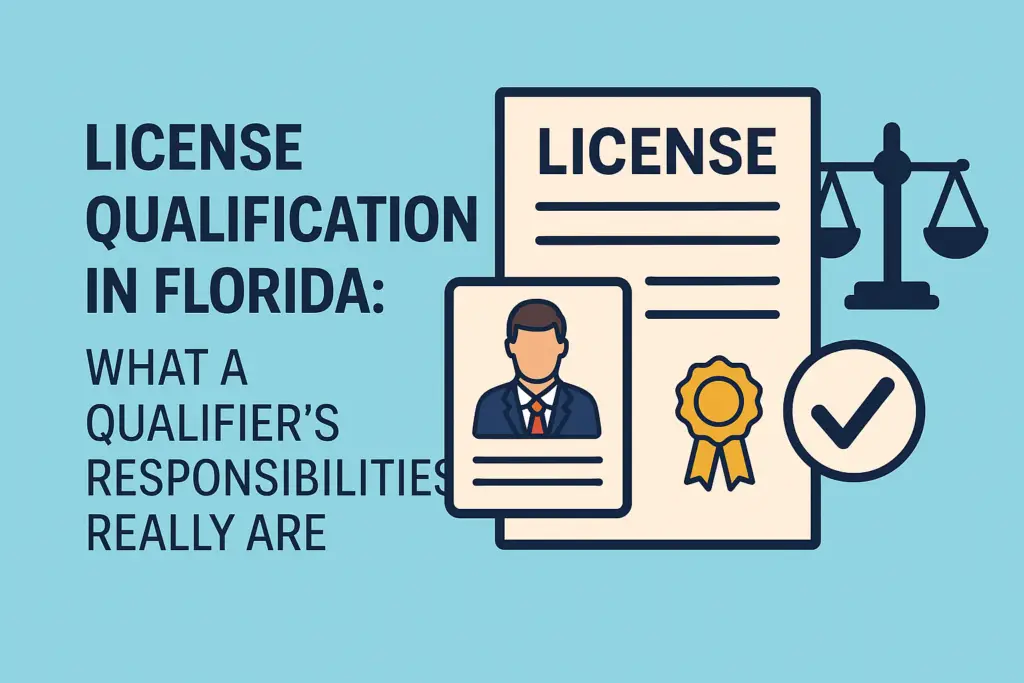Understanding the Legal Duties of Qualifying Agents Under Florida Law
If you’re a licensed contractor in Florida, you’ve likely been approached by someone asking:
“Will you qualify my company so we can operate under your license?”
On the surface, it may seem like a simple business arrangement. But the moment you agree to become a qualifier—or “qualifying agent”—you step into a legally responsible role with real obligations and significant liability exposure.
Whether you’re considering qualifying a friend’s company or joining a business you don’t control, it’s essential to understand what Florida law actually expects of you—and how a properly drafted Qualifier Agreement can help protect your license, your livelihood, and your reputation.
🏗️ What Is a Qualifying Agent in Florida?
A qualifying agent is a licensed contractor who assumes legal responsibility for a business entity operating in Florida’s construction industry. Under Florida Statutes Chapter 489, a construction company must be qualified by someone who holds the proper license for the scope of work the business intends to perform.
That qualifying agent becomes the link between the company and the state—and is ultimately responsible for ensuring that the company:
- Operates lawfully and ethically
- Follows DBPR and CILB regulations
- Supervises work and jobsite operations appropriately
- Maintains financial responsibility and insurance
- Completes jobs in accordance with contract and code
⚠️ The Responsibilities Are Serious—Even if You’re Not on the Jobsite
Many qualifiers assume they’re simply “lending” their license to a company and have no day-to-day obligations. That’s a dangerous misunderstanding.
Even if you’re not managing jobs or supervising crews, the CILB can still discipline you—including fines, license suspension, or revocation—if the business:
- Performs unlicensed or unpermitted work
- Abandons jobs or commits fraud
- Is sued for defective construction
- Fails to supervise work in accordance with the law
You don’t have to be at the jobsite to be held responsible. That’s why qualifiers need to be very careful about how the relationship is structured—and documented.
📄 The Role of a Written Qualifier Agreement
If you’re qualifying a business, you must have a clear, attorney-drafted agreement in place that defines:
- What you are (and are not) responsible for
- How supervision will occur (if at all)
- What indemnification protections you have
- What insurance the company must carry
- How and when you can terminate the relationship
This isn’t just a formality—it’s your protection against liability if something goes wrong. And if you’re ever questioned by the DBPR or named in a lawsuit, your agreement becomes critical evidence showing you acted in good faith and within defined limits.
👨⚖️ Our Firm Focuses on Protecting Qualifiers
At Douglas Law Firm, we draft custom Qualifier Agreements that are:
- Tailored to your specific business relationship
- Designed to reduce your risk of licensing violations or lawsuits
- Compliant with Florida law and CILB expectations
- Ready to stand up in court or before the licensing board if needed
We’ve seen too many contractors get pulled into costly disputes simply because they didn’t take the time to structure their qualifier arrangement properly.
✅ Quick Checklist: Are You Taking on Qualifier Risk?
You may be taking on legal exposure if you are:
- Signing permit applications or contracts for a business you don’t control
- Qualifying multiple entities without DBPR approval
- Not involved in any jobsite supervision
- Not receiving proof of insurance, tax compliance, or financial records
- Working under a verbal agreement with no written contract
If any of these apply to you—you need legal protection in writing.
📌 Final Word
Being a qualifier in Florida comes with prestige—but also responsibility. If you’re going to lend your license, do it with your eyes open and your rights protected.
📞 At Douglas Law Firm, we help Florida contractors protect their license and limit their liability by drafting strong, enforceable Qualifier Agreements. Whether you’re qualifying your first business or want to formalize an existing relationship, we’re here to help.
